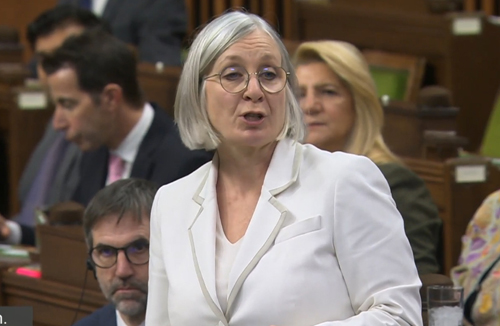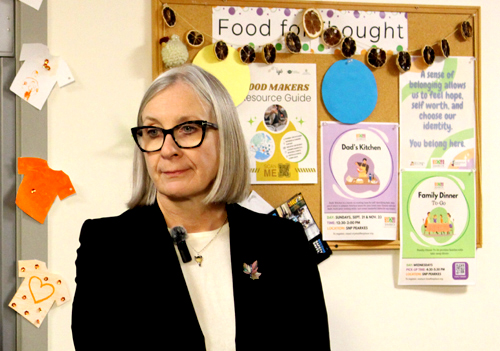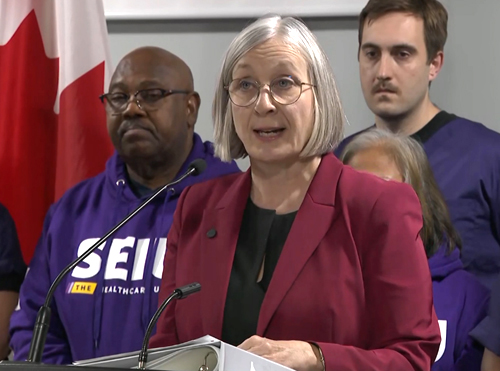 Patty Hajdu, Jobs and Families Minister, in the House of Commons, Oct 28, 2025. [livestream]
Patty Hajdu, Jobs and Families Minister, in the House of Commons, Oct 28, 2025. [livestream]

Sunday November 2, 2025 | VICTORIA, BC
Exclusive interview with Island Social Trends | by Mary P Brooke
When Minister of Jobs and Families Patty Hajdu came to town last month, on Oetober 10 she delivered a preview of the child care and national school food program components of the upcoming federal Budget 2025.
 Patty Hajdu, Jobs and Families Minister, promoted the National School Food Program at a child care centre in Saanich on Oct 10, 2025. [Mary P Brooke / Island Social Trends]
Patty Hajdu, Jobs and Families Minister, promoted the National School Food Program at a child care centre in Saanich on Oct 10, 2025. [Mary P Brooke / Island Social Trends]
She addressed media with that focus on families and affordability at the Saanich Neighbourhood Place child care centre ahead of Thanksgiving weekend.
As well, Minister Hajdu explored a few key labour market topics in an exclusive interview with Island Social Trends.
 Jobs and Families Minister Patty Hajdu visited a child care centre in Saanich on Oct 10, 2025. [Island Social Trends]
Jobs and Families Minister Patty Hajdu visited a child care centre in Saanich on Oct 10, 2025. [Island Social Trends]
Canada Post:
On the Canada Post side of her portfolio, we asked Minister Hajdu if she considered rotating strikes a step forward from the full strike of previous days.
“As long as there’s no progress at the table I’m not sure it’s a step forward,” said Hajdu. “We’re still seeing strike action.” She felt that Canadians “getting some mail delivery” was good “but what Canadians want is an end to this and an agreement between the corpoation and the union”.
“And so now it rests on those two parties,” said Hajdu. “What we need is that productive bargaining to continue.”
 Canada Post news section [Island Social Trends]
Canada Post news section [Island Social Trends]
“These two parties have had a very hard time coming to a collective agreement that works for everyone,” Hadju told Island Social Trends.
“I think both parties have to give in various spaces and these will be conversations that will be necessary for the future of Canada Post,” said Minister Hajdu.
Canada Post Corporation has been losing money since 2018. Has Canada Post been speaking adequately enough about their challenges?
 Keen insights for informed people. Get signed up for a Premium ENews Subscriptions – for people in the know who want to know more.
Keen insights for informed people. Get signed up for a Premium ENews Subscriptions – for people in the know who want to know more.
She highlighted the Kaplan Report which she feels “asked the right question”, which is “fundamentally why can’t these parties get a deal — it’s been 20 years of government intervention to assist in collective agreements.
“That can’t continue. Ninety-seven percent of collection agreements in federal regulated spaces are arrived at without any government intervention at all,” said the Jobs and Families Minister.
The two sides have been locked in separate realities for a long time.
“The question before Mr Kaplan was what are the structural problems that are resulting in essentially an impasse.” She pointed out that the report issued on May 15, 2025 included recommendations for the government, the corporation and the union.
Indeed, Canada Post workers did get back to work (with rotating strikes) starting October 11 with the processing of some mail and parcels. CUPW members in the Quebec Region continue their action by not processing and delivering unaddressed flyers (Neighbourhood Mail).
 Community mailboxes in a suburban area, Oct 2025. [Island Social Trends]
Community mailboxes in a suburban area, Oct 2025. [Island Social Trends]
On October 30, both parties — Canada Post and the Canadian Union of Postal Workers” met with mediators. But the Minister of Government Transformation, Public Works and Procurement Joël Lightbound who is responsible for Canada Post, has allowed flexibilities for the corporation to adjust the way services are delivered, to reflect the delivery patterns of correspondence as digitalization has taken over our lives.”, said Hajdu last month.
Last week Lightbound announced that he’s ready to allow big job cuts. Possibly 10,000 jobs could be lost to changes at the Crown Corporation, experts say.
“All Canadians agree that we need to have a national postal service,” Hajdu told Island Social Trends last month. “All Canadians agree that Canada Post delivers in places that no one else can.” She noted that Indigenous and rural and remote communities have no other options for receiving mail and parcels.
Hajdu highlights modernization as something that’s happening across various sectors of the economy “and Canada Post is no different”.
“I hope that all parties are looking at that report. We took that seriously. We did improve flexibility for the corporation to make some of those operating changes. We’ll see what happens next.”
Parcels is where Canada Post has seen the most growth in recent years. Can Canada Post retail outlets expand their services and increase their revenue?
 Many small businesses and households rely on Canada Post for parcels and mail [Canada Post image]
Many small businesses and households rely on Canada Post for parcels and mail [Canada Post image]
“Canada Post first has to stabilize it’s core service before it considers expanding into other service delivery models,” said Hajdu. She noted that CUPW has proposed postal banking. The core operation of any organization includes a productive relationship with employees or employer.
“What the two parties need to figure out now is what kinds of flexibilities need to be available in a collective agreement that allows Canada Post and its members to evolve with the evolving state of the business line,” says Hajdu. “That work that they have to do together.”
Vision for reshaping jobs in Canada:
Can Canada Post be a model or flagship for that? CUPW workers presently have jobs for life but now if people will lose their jobs.
Is ther eroom to ahve the govt take leadership to move jobs, through retraining, to AI.
There is flexibilities within the corporation. Canada Post has its own board and agenda.
“That conversation is happening across sectors, and the federal government in spaces where there needs to be transformation is investing in supports for skills training, We transfer billions of dollars every single year to provinces and territories to do skills training. But we also support specifica industires and we also have an EI fund that does a lot of that training.
Hajdu says government is excited when a sector asks about “keeping employees attached to the workforce” in light of digitization and technology. She mentioned worksharing when a business is transitioning to a new way of doing business, by keeping employees on, have EI pick up some of the costs of the slowdown while they actually do that transition to a new business line or new process.
“This is the real question of our time and it ties in with the workforce strategy that I’m working on with a number of colleagues at the federal level as to how we can support that transition that is happening in many many sectors,” said Hajdu on October 10.
Training innovation:
On October 27 Minister Hajdu announced trades training support, a tax break for personal support workers, and mobility improvements. She said that the upcoming federal budget on November 4 will include:
 Jobs and Families Minister Patty Hajdu at Oct 27, 2025 press conference in Ottawa. [livestream]
Jobs and Families Minister Patty Hajdu at Oct 27, 2025 press conference in Ottawa. [livestream]
$75 million over the next three years to boost the Union Training and Innovation Program (UTIP) focused on the building trades; helping Red Seal apprentices get access to training is part of the package. “Jobs will be created as well as pathways to meaningful long term careers that will really build Canada strong, the minister stated,” said Hajdu.
A tax credit that can save personal support workers (PSWs) up to $1,100 a year (up to 5% of eligible earnings) in provinces that don’t already have sectoral wage supplement agreements with the federal government; there are about 380,000 personal support workers in Canada. This is backed by $1.5 billion over five years. “Care can’t wait,” said Hajdu, noting that the care sector is essential to the economy.
Proposed amendments to the Canada Labour Code to limit the use of non-compete agreements in federally regulated sectors, to strengthen fairness in the labour market and build one Canadian economy by promoting mobility, innovation and opportunity across the country.
Air Canada strike:
“AT the end of the day the results was good. The two parties did come together and they hashed out the majority of the collective agreement. There was one dispute still around wages — not the unpaid part but wages in general that went to the CIRB and they agreed to go to the artitraot rot help with a decision around that.
We have launched a probe into this unpaid work. My understanding is this is an industry practice. Nonetheless, if it’s unfair and its’ not working for employees then it’s unsustainable. And we have a labour code that … specifically and explicitly says that not paying for work is illegal,” adding that’s why the Liberal didn’t vote for a Conservative bill in 2018.
“Why have there been no grievances? Partly because of the way that conversation is structured,” said Hajdu, adding that she is looking forward to results of the investigation in terms of what the root problems are and what the solutions are we’ll take it from there.
Broader role:
Departments that support workers, business and business loans, grants and business development all work together at the federal level.
“My job is to marshall all of this into a bit of a strategy for the federal government.”
 Patty Hajdu, Jobs and Families Minister, in the House of Commons, Oct 28, 2025. [livestream]
Patty Hajdu, Jobs and Families Minister, in the House of Commons, Oct 28, 2025. [livestream]
“In the federation, nothing is done with only one level of government. We have to be thinking through how the provinces fit together. We do have a table of labour market ministers who come together to talk about how we participate more closely,” said Hajdu.
The labour market ministers last met in May where a key topic was labour mobility and related issues like occupational health and safety training and licensing and the “vital role” of modernizing Labour Market Transfer Agreements.
“I think we’re seeing a high degree of desire to cooperate right now as a result of the kind of tariff actions that we’re seeing that are deeply threatening many of our sectors.”
Youth employment:
Hajdu says that youth employment is “the first thing that we’re going to tackle at the labour market ministers meeting… it’s kind of a leading indicator of the kinds of challenges that we are seeing in the labour market related to a global slowdown of trade, and in particular the tariff actions we’ve been seeing from our largest trading partner.”
“The prime minister’s right. Much of our trade is protected through CUSMA which is right now underway in terms of its review. But it doesn’t mean there aren’t sectors that are deeply suffering. It’s often youth that are hardest hit when sectors start to go down. Not because they’re employed in that sector. But as people get laid off they spend less money in small businesses, in retail and restaurants. And then those kind of slowdowns really impact youth jobs.”
“We’ve got a number of different things federally that we try to support youth with to get good quality experience. We youth to not just have experience in retail or restaurants but to get experience in their own field.
 Get the Urban Food Resilience Initiatives Society (UFRIS) E-Newsletter. It’s free!
Get the Urban Food Resilience Initiatives Society (UFRIS) E-Newsletter. It’s free!
Supporting business:
“We’ve supported small businesses – in the billions of dollars — especially through the pandemic where we covered wages — nearly all the wages for small businesses including wages, said Hajdu. However, it should be noted many small businesses didn’t qualify for or missed out on the CEBA loans.
“For almost all of the small businesses we paid for rent, we supported them with small business loans and grants. And now we have other small business supports including tax relief,” said Hajdu.
“Small business support is there and we’re committed to that support,” said Hajdu. Some numbers to come on this.
Every corporation has to be looking at how they’re going to attract, train and retain their staff. Components of that include salary, opportunity or leadership experience. “Smart business will think about how they’re going to keep a continual crop of good-quality employees,” said Hajdu, especially if the wages are relatively low, she added.
 Local, provincial and federal news and analysis posted daily at IslandSocialTrends.ca.
Local, provincial and federal news and analysis posted daily at IslandSocialTrends.ca.
===== RELATED:







